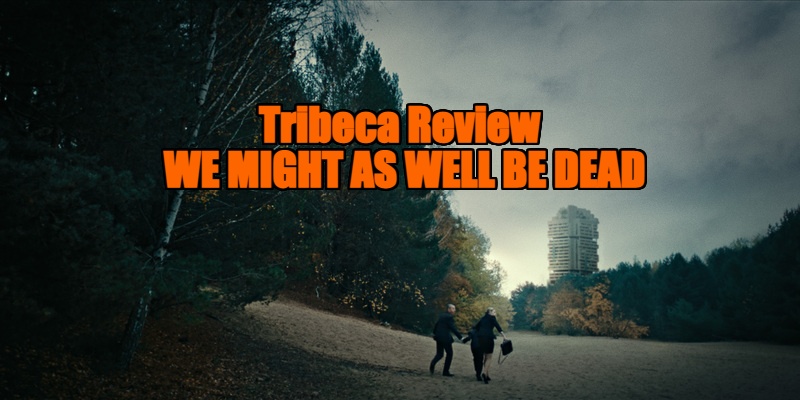
The well-maintained order of an exclusive apartment block begins to break
down when a dog goes missing.
Review by
Eric Hillis
Directed by: Natalia Sinelnikova
Starring: Ioana Iacob, Pola Geiger, Jörg Schüttauf, Siir Eloglu, Susanne Wuest, Mina Sadic

Apartment complexes have served as microcosms of society in films like
David Cronenberg's Shivers, Ben Wheatley's
High Rise
and Kleber Mendonça Filho's Neighboring Sounds. The latest filmmaker to adopt such a setting is
Natalia Sinelnikova, whose directorial debut
We Might As Well Be Dead employs an exclusive German
apartment complex for an allegory on the rise of fascism.

Set in a near future where the land is ravaged by some unspoken chaos
and referred to as "out there," the movie takes place in one of the last
bastions of civilisation, a high rise apartment complex on the outskirts
of a forest. The film begins with an absurdist tone not unlike that of
the works of Yorgos Lanthimos, as we witness a desperate family arrive
at the complex seeking sanctuary. They're initially vetted by the
complex's head of security, the stern Anna (Ioana Iacob), who
ignores their pleading for a good word to be put in with her
superiors.
The more we learn of Anna the more we realise why she's so determined
to play by the house rules. As both a foreigner and a Jew, she's all too
wary of standing out, and is constantly reminded by her superiors of
their good graces in allowing her such a post. Her position in the
community is threatened by the behaviour of her daughter Iris (Pola Geiger), who is convinced she has "the evil eye" and can will bad things to
happen with her thoughts. Believing she is responsible for the
mysterious disappearance of the building caretaker's dog, Iris refuses
to leave her bathroom, forcing Anna to bathe in the empty apartments and
use her kitchen sink as a makeshift toilet during late night
emergencies.

A self-fulfilling prophecy is invoked when Iris has a vision of a
serial killer penetrating the community's fence and massacring a family
that lives on the ground floor. Despite dismissing her daughter's words
as nonsense, Anna decides to check on the family all the same, and is
mistaken for an intruder, leading the community to believe that they
really are under threat. The communal paranoia is compounded when the
caretaker (Jörg Schüttauf) finds a dead rodent and somehow
convinces the other residents it's the corpse of his dog. Despite Anna's
pleas for sanity, she finds her position undermined as a golf club
wielding vigilante mob is assembled. When the apartment admins force the
residents to reapply for tenancies, Anna is forced to take drastic
action to ensure her place in the building continues.
If on paper, We Might As Well Be Dead seems like a rather
on-the-nose allegory for Germany's past, Sinelnikova ensures it never
veers into the after school special territory of something like
The Wave. It would be easy to make Anna a one-dimensional victim to hammer home
the film's point, but Sinelnikova gives us a protagonist who isn't above
victimising those even more vulnerable than herself to ensure the
survival of herself and her daughter. We find ourselves not so much
rooting for Anna as rooting against the rot setting in around her.
Iocab's uptight performance goes against the traditional grain of such
stories as Anna refuses to allow any internal cracks to appear. Watching
Anna plead with the terrified residents to allow themselves to leave the
building and enjoy the outdoors, the movie becomes a clever reversal of
the dynamic between Roy Scheider's sheriff and his townspeople in
Jaws.

With a surname like Sinelnikova, the director is no doubt all too
familiar with the sort of unease her anti-heroine feels in her position.
She's made a remarkably cynical film that suggest Germany's liberal face
is but a thin veneer, its citizens waiting for someone to convince them
a rodent is a dog to allow their bigotry to rise once again. Made as a
graduation film for the Babelsberg Film University,
We Might As Well Be Dead may be the most impressive movie
made by a college student since John Carpenter's Dark Star. If Sinelnikova can create a world this convincing on a college
budget, I eagerly await to see what she might achieve with more
traditional filmmaking resources.


